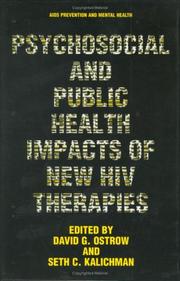| Listing 1 - 2 of 2 |
Sort by
|
Book
ISSN: 17142970 ISBN: 2760517780 1435690559 9781435690554 9782760517783 2760512762 9782760512764 Year: 2004 Publisher: Sainte-Foy [Que.] Presses de l'Université du Québec
Abstract | Keywords | Export | Availability | Bookmark
 Loading...
Loading...Choose an application
- Reference Manager
- EndNote
- RefWorks (Direct export to RefWorks)
La mise au point des nouveaux traitements contre le VIH/sida a profondément modifié les stratégies de lutte et transformé les représentations de l'épidémie et le rapport à la maladie. Pour certains, ils ont contribué à une amélioration de la santé, mais ils ont eu aussi des répercussions médicales, sociales et psychologiques qui ont affecté les différentes sphères de la vie des personnes vivant avec le VIH. S'appuyant sur des perspectives complémentaires issues des sciences sociales (anthropologie, psychologie sociale, sociologie), cet ouvrage présente un portrait des principaux enjeux associé
AIDS (Disease) --- Antiretroviral agents. --- Acquired immune deficiency syndrome --- Acquired immunodeficiency syndrome --- Acquired immunological deficiency syndrome --- HIV infections --- Immunological deficiency syndromes --- Virus-induced immunosuppression --- Anti-retroviral agents --- Antiretroviral drugs --- Antiretrovirals --- Antiviral agents --- Patients --- Attitudes. --- Treatment --- Psychological aspects. --- Chemotherapy --- Acquired Immunodeficiency Syndrome --- HIV Infections --- Antiretroviral Therapy, Highly Active --- Antiretroviral agents --- drug therapy --- psychology --- Psychological aspects --- Attitudes --- Acquired Immunodeficiency Syndrome - drug therapy --- HIV Infections - drug therapy --- Patients - psychology --- AIDS (Disease) - Chemotherapy - Psychological aspects --- AIDS (Disease) - Treatment - Psychological aspects --- AIDS (Disease) - Patients - Attitudes

ISBN: 0306459736 1280207124 9786610207121 0306471590 Year: 1999 Publisher: New York : Kluwer Academic Publishers,
Abstract | Keywords | Export | Availability | Bookmark
 Loading...
Loading...Choose an application
- Reference Manager
- EndNote
- RefWorks (Direct export to RefWorks)
“AIDS is kind of like life, just speeded up. ” JavonP. ,heroin addict with AIDS, Bronx, New York, 1988 “Now I’m not so much scared of dying as scared of living. ” Mike D. , heroin addict with AIDS, New Haven, Connecticut, 1998 Within little more than a decade, AIDS has been transformed from an untreatable, rapidly fatal illness, into a manageable, chronic disease. Most of this transformation has occurred in the past five years, accelerated by the advent of protease inhibitors and the proven benefits of combination antiretroviral therapy and prophylaxis against opportunistic infections. For people living with HIV/AIDS, these developments have offered unprecedented hope, and also new challenges. As reflected in the quotes above, some of the anxieties and anticipation of premature dying have been replaced by the uncertainties involved in living with a long-term, unpredictable illness. The role of caregivers for people with HIV/AIDS has also changed radically over this time. Earlier in the epidemic, we learned to accompany patients through illness, to bear witness, to advocate, to address issues of death, dying, and bereavement. The arrival of more effective therapy has brought with it new capabilities, but also new complexities, raising difficult problems concerning access to care, adherence, and toxicity.
AIDS (Disease) --- Chemotherapy, Combination --- Patient compliance. --- Protease inhibitors --- Chemotherapy --- Psychological aspects. --- Social aspects. --- Therapeutic use --- AIDS (Disease) -- Chemotherapy -- Psychological aspects. --- AIDS (Disease) -- Chemotherapy -- Social aspects. --- Chemotherapy, Combination -- Social aspects. --- Protease inhibitors -- Therapeutic use -- Social aspects. --- Medicine. --- Public health. --- Health promotion. --- Infectious diseases. --- Health psychology. --- Medicine & Public Health. --- Public Health. --- Health Promotion and Disease Prevention. --- Infectious Diseases. --- Health Psychology. --- Emerging infectious diseases. --- Psychology, clinical. --- Health psychology --- Health psychology, Clinical --- Psychology, Clinical health --- Psychology, Health --- Salutogenesis --- Clinical psychology --- Medicine and psychology --- Health promotion programs --- Health promotion services --- Promotion of health --- Wellness programs --- Preventive health services --- Health education --- Community health --- Health services --- Hygiene, Public --- Hygiene, Social --- Public health services --- Public hygiene --- Social hygiene --- Health --- Human services --- Biosecurity --- Health literacy --- Medicine, Preventive --- National health services --- Sanitation
| Listing 1 - 2 of 2 |
Sort by
|

 Search
Search Feedback
Feedback About UniCat
About UniCat  Help
Help News
News